Related Research Articles

USS Indianapolis (CA-35) was a Portland-class heavy cruiser of the United States Navy, named for the city of Indianapolis, Indiana. Launched in 1931, it was the flagship for the commander of Scouting Force 1 for eight years, then flagship for Admiral Raymond Spruance from 1943 to 1945 while he commanded the Fifth Fleet in battles across the Central Pacific during World War II.
In the United States Armed Forces, Non-judicial punishment (NJP) is a disciplinary measure that may be applied to individual military personnel, without a need for a court martial or similar proceedings.

A court-martial or court martial is a military court or a trial conducted in such a court. A court-martial is empowered to determine the guilt of members of the armed forces subject to military law, and, if the defendant is found guilty, to decide upon punishment. In addition, courts-martial may be used to try prisoners of war for war crimes. The Geneva Conventions require that POWs who are on trial for war crimes be subject to the same procedures as would be the holding military's own forces. Finally, courts-martial can be convened for other purposes, such as dealing with violations of martial law, and can involve civilian defendants.
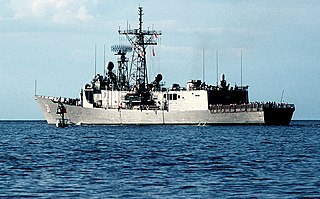
USS Stark (FFG-31) was the 23rd ship of the Oliver Hazard Perry class of guided-missile frigates and was named after Admiral Harold Raynsford Stark (1880–1972). Ordered from Todd Pacific Shipyards in Seattle, Washington, on 23 January 1978, Stark was laid down on 24 August 1979, launched on 30 May 1980, and commissioned on 23 October 1982. In 1987, an Iraqi jet fired two missiles at Stark, killing 37 U.S. sailors on board. Decommissioned on 7 May 1999, Stark was scrapped in 2006.
Military justice is the body of laws and procedures governing members of the armed forces. Many nation-states have separate and distinct bodies of law that govern the conduct of members of their armed forces. Some states use special judicial and other arrangements to enforce those laws, while others use civilian judicial systems. Legal issues unique to military justice include the preservation of good order and discipline, the legality of orders, and appropriate conduct for members of the military. Some states enable their military justice systems to deal with civil offenses committed by their armed forces in some circumstances.

The Judge Advocate General's Corps also known as the "JAG Corps" or "JAG" is the legal arm of the United States Air Force.

USS San Francisco (SSN-711) is a Los Angeles-class nuclear submarine, the third ship or boat of the United States Navy to be named for San Francisco, California.
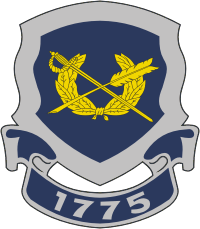
The Judge Advocate General's Corps of the United States Army, also known as the U.S. Army JAG Corps, is the legal arm of the United States Army. It is composed of Army officers who are also lawyers, who provide legal services to the Army at all levels of command, and also includes legal administrator warrant officers, paralegal noncommissioned officers and junior enlisted personnel, and civilian employees.

Charles Butler McVay III was an American naval officer and the commanding officer of the cruiser USS Indianapolis which was lost in action in 1945, resulting in a significant loss of life. Of all captains in the history of the United States Navy, he is the only one subjected to court-martial for losing a ship sunk by an act of war, despite the fact that he was on a top secret mission maintaining radio silence.

The United States Army Trial Defense Service is an independent Field Operating Agency within the U.S. Army Judge Advocate General's Corps and falls under the Commanding General of the U.S. Army Judge Advocate General's Legal Center and School. The TDS motto is "Defending Those Who Defend America."
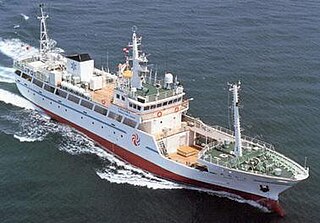
On 9 February 2001, about nine nautical miles south of Oahu, Hawaii, in the Pacific Ocean, the United States Navy (USN) Los Angeles-class submarine USS Greeneville (SSN-772) collided with the Japanese fishery high-school training ship Ehime Maru (えひめ丸) from Ehime Prefecture. In a demonstration for some VIP civilian visitors, Greeneville performed an emergency ballast blow surfacing maneuver. As the submarine shot to the surface, she struck Ehime Maru. Within ten minutes of the collision, Ehime Maru sank. Nine of the thirty-five people aboard were killed: four high school students, two teachers, and three crew members.

Mochitsura Hashimoto was a Japanese officer and a submarine commander in the Imperial Japanese Navy during World War II. He was captain of the submarine I-58, which sank the American heavy cruiser USS Indianapolis in 1945 after its delivery of parts and enriched uranium for the first atomic weapon used in wartime, Little Boy, prior to the attack on Hiroshima.

On 29 August 2007, six AGM-129 ACM cruise missiles, each loaded with a W80-1 variable yield nuclear warhead, were mistakenly loaded onto a United States Air Force (USAF) B-52H heavy bomber at Minot Air Force Base in North Dakota and transported to Barksdale Air Force Base in Louisiana. The nuclear warheads in the missiles were supposed to have been removed before the missiles were taken from their storage bunker. The missiles with the nuclear warheads were not reported missing and remained mounted to the aircraft at both Minot and Barksdale for 36 hours. During this period, the warheads were not protected by the various mandatory security precautions for nuclear weapons.

Glenn R. Brindel is a former United States Navy officer. He was the commanding officer of USS Stark and was in command when the ship was attacked and struck by two Exocet missiles in the Persian Gulf on May 17, 1987. The incident review board, led by Rear Admiral Grant Sharp, recommended he be court-martialed for his actions. However, he was relieved of command and given non-judicial punishment by Adm. Frank B. Kelso II, commander of the Atlantic fleet. According to the New York Times, in 1987 he received a letter of reprimand and elected to retire early. He had not served as a captain long enough to retire at that grade, so he had to retire at the rank of commander. The U.S. Naval Register, however, lists Brindel as retiring October 2, 1990, as a captain. 37 sailors were killed in the attack.

Owen Paul Honors Jr., is a retired United States Navy captain who served as commanding officer of the nuclear-powered aircraft carrier USS Enterprise before being relieved of his command due to videos he had made and shown aboard the same vessel while he was serving as executive officer.
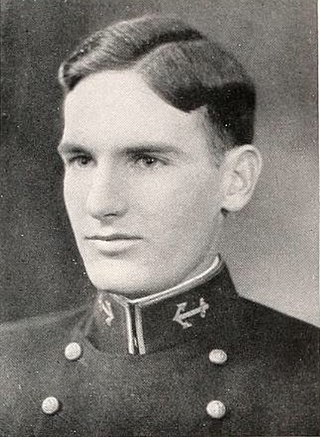
Charles Elliott Loughlin was an officer of the United States Navy, where he reached the rank of Rear Admiral. He is best known for his court-martial following the controversial sinking of the Japanese hospital ship Awa Maru. He was the commanding officer of the USS Queenfish (SS-393) during four war patrols. Loughlin earned two Navy Crosses, two Legions of Merit and one Silver Star during his time in the United States Navy.

A video of U.S. Marines urinating on Taliban fighters was posted to websites in January 2012. The video was widely viewed on YouTube, TMZ and other sites, and caused anger and outrage in Afghanistan and the Middle East.
The Judge Advocate General's Corps is the military justice branch or specialty of the United States Air Force, Army, Coast Guard, Marine Corps, and Navy. Officers serving in the JAG Corps are typically called judge advocates.
Unlawful command influence (UCI) is a legal concept within American military law. UCI occurs when a person bearing "the mantle of command authority" uses or appears to use that authority to influence the outcome of military judicial proceedings. Military commanders typically exert significant control over their units, but under the Uniform Code of Military Justice (UCMJ) a commander must take a detached, quasi-judicial stance towards certain disciplinary proceedings such as a court-martial. Outside of certain formal actions authorized by the UCMJ, a commander using their authority to influence the outcome of a court-martial commits UCI. If UCI has occurred, the results of a court-martial may be legally challenged and in some cases overturned.
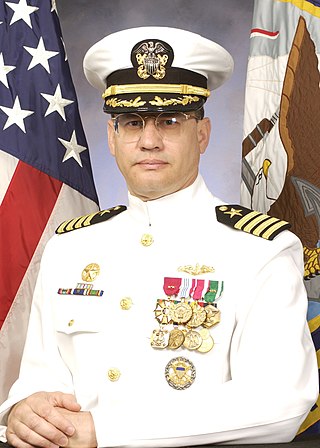
William Joseph "Bill" Toti is an American author, photographer, military technology corporate executive, and former naval officer. Toti was the final captain of the Los Angeles-class submarine USS Indianapolis (SSN-697) and also served as commodore of Submarine Squadron 3 in Pearl Harbor, Hawaii. He is known for his role in the exoneration of Captain Charles B. McVay III of the World War II cruiser USS Indianapolis (CA-35), as well as for his actions during the September 11, 2001 terrorist attack on the Pentagon. He authored the 2022 book, From CO to CEO: A Practical Guide for Transitioning from Military to Industry Leadership.
References
- ↑ Zuchino, David (May 29, 2010). "U.S. report faults drone crew, command posts in Afghan civilian deaths". Los Angeles Times. Retrieved 30 May 2010.
- ↑ Richard, A. Hulver (2018). A Grave Misfortune: The USS Indianapolis Tragedy. ISBN 9781943604265 . Retrieved 21 May 2020.
- ↑ Magin, Janis L. (13 July 2001). "Navy exonerates WWII captain". The Argus-Press . Owosso, Michigan . Retrieved 31 July 2011.
- ↑ The Associated Press. "Military cites poor oversight in mistaken shipment of warheads to Taiwan." NBC News, Sept. 25, 2008; accessed 2008-09-26.